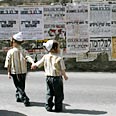
Haredi housing shortage worsening
Geocartography knowledge Group reveals that solving ultra-Orthodox population's housing problem would require construction of 4,000 new apartments a year. At the moment, more than 3,000 housing units are missing
The direct result of the ministry's decision is that a project including 1,100 housing units for the ultra-Orthodox public in Modiin Illit's Matityahu neighborhood is slated to be canceled.
"This may worsen the housing shortage in the haredi sector, which has yet to receive a constitutional response," says Dr. Rina Degani, research director and managing director at Geocartography, which recently examined the situation of the haredi housing market.
According to the findings of a Geocartography survey, the growth rate in the haredi sector creates a fixed demand for some 6,500 housing deals a year – about 6.5% of all deals in the residential real estate field carried out in the past two years.
Modiin illit has some 40,000 residents due to the comfortable housing prices and the communal fabric, which meets the target audience's demands.
According to a study carried out by Geocartography's economic division, the demand for apartments in the haredi sector requires the construction of at least 4,000 new flats every year, in addition to some 2,500 second-hand apartments.
Most apartments go to young people
According to Geocartography, the ultra-Orthodox public in Israel is comprised of some 700,000 people, which make up about 130,000 households. Some 75% of the demands for apartments in the haredi sector – about 4,800 housing units – are made by young couples.
While about two-thirds of the secular sector purchase second-hand apartments, only one-quarter of the haredi sector buy second-hand flats. Most prefer to purchase a new apartment from a contractor.
It's hard to find a second-hand apartment in the haredi market due to families' low turnover rates. The strong natural increase in haredi families makes it difficult for households to move to larger apartment often due to the economic limit, and thus they are forced to live in great crowdedness.
The crowdedness problem leads to solutions such as partial expansions of existing apartments, taking advantage of the apartment height by placing children's beds in floors, and making efficient use of every niche as a storage area.
Degani says that the haredim are interested in purchasing an apartment of 3.8 rooms on average, for some NIS 700,000 (about $ 169,900). According to her, some 40% of haredim can afford to purchase an apartment for a lower sum which does not exceed NIS 500,000 ($121,361).
Dgani stresses that the desired price for an apartment in the haredi market is much lower than the desired price in the secular sector, which stands at some NIS 800-900,000 ($195-219,000) on average.
"The housing distress in the haredi sector is a time bomb and its dimensions are getting increasingly worse. Therefore, the decision makers must address this matter immediately and come up with concrete solutions," Degani says
Jerusalem takes the lead
Although Bnei Brak is considered the most prominent stronghold of the haredi sector, the most desired community by ultra-Orthodox apartment buyers is Jerusalem (40%). Some 20% of the haredim prefer Bnei Brak, but will settle for religious communities like Elad, Beit Shemesh, Beitar Illit, Petah Tikva and others.
Degani adds that it is important to develop housing solutions for the haredi population in large communities where a local infrastructure of employment sources can be found.
In addition, as the haredi public's motorization level is low compared to the secular public, it must be provided with accessible mobility and transportation means besides the communal services characterizing every haredi neighborhood.










